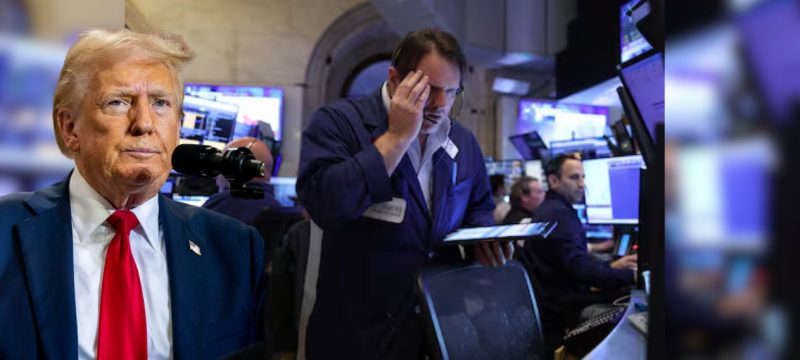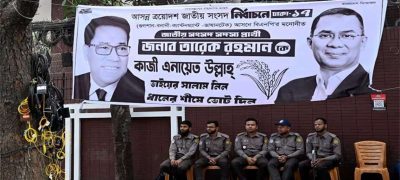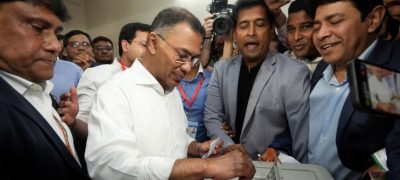U.S. stock markets have suffered their most severe two-day decline since the onset of the COVID-19 crisis, driven by fears of a looming global trade war after former President Donald Trump announced sweeping new tariffs.
By Friday’s close, the Dow Jones had dropped 5.5%, the Nasdaq fell 5.8%, and the S&P 500 slipped nearly 6%. This marks the sharpest fall in major U.S. indices since March 2020, when the pandemic led to widespread lockdowns and economic shutdowns.
Read more: iPhone Prices Set to Surge Amid Trump’s New Tariffs
Investor panic set in after Trump revealed plans for broad “reciprocal tariffs” earlier this week. His proposal includes a baseline 10% import tax on nearly all foreign goods, with some duties spiking to as much as 50% for over 60 countries. The move sparked immediate backlash, particularly from China, which retaliated with a 34% tariff on U.S. products — its most forceful response yet.
These developments have heightened fears of a global economic downturn.
“This is fuelling anxiety over an all-out trade war,” reported Kristen Saloomey from the New York Stock Exchange. “That panic is being mirrored in market behavior.”
International reaction has been swift. The European Union harshly condemned the move, with EU Trade Commissioner Maros Sefcovic calling the 20% tariffs on European goods both “unfair” and “harmful,” and warning that the EU is ready to defend its interests.
The United Nations also voiced concern over the consequences for economically vulnerable nations. Rebeca Grynspan, head of the UN Conference on Trade and Development, highlighted that developing countries — particularly in Africa and Southeast Asia — could suffer severely as trade revenues are crucial for their public spending.
“Trade should foster stability and growth, not become a source of turmoil,” Grynspan stated.
Trump Stands Firm
Despite the economic chaos and criticism, Trump stood by his decision. While attending a LIV Golf event in Florida, he wrote on Truth Social: “TO THE MANY INVESTORS COMING INTO THE UNITED STATES AND INVESTING MASSIVE AMOUNTS OF MONEY, MY POLICIES WILL NEVER CHANGE.”
He also referenced recent job data, which reported 228,000 new jobs in March — a figure recorded before the tariffs were put into effect.
Democratic leaders slammed Trump for celebrating at a golf event during a period of economic distress. Senate Majority Leader Chuck Schumer accused him of being detached from reality, while Senator Ben Ray Lujan criticized the former president for golfing while Americans struggle to make ends meet.
Republicans, however, continued to back Trump. Senator John Barrasso praised him as a “negotiator,” noting his willingness to address trade issues individually with each country.
Fed Flags Economic Risks
Adding to market fears, Federal Reserve Chair Jerome Powell warned that the new tariffs could aggravate inflation and contribute to rising unemployment.
“We’re entering uncertain territory,” Powell stated during a press conference. “There’s an elevated risk of both job losses and inflation.”
He also dismissed suggestions — including from Trump — to lower interest rates as a response, emphasizing that the long-term impact of the tariffs remains unclear.
“This is a marathon, not a sprint,” Powell said.
International Alarm Grows
Over the weekend, global condemnation of the tariffs continued. Experts suggest Trump’s measures could signal a shift away from multilateral trade norms, catching allies off guard.
Economist Ha-Joon Chang said in an interview with Al Jazeera that these actions may usher in a “new economic order” and warned the U.S. to reconsider its trade strategies.
Poorer nations like Laos, Lesotho, and Madagascar appear to be among the hardest hit. The Trump administration’s tariff formula mirrors — and in some cases doubles — the duties these countries charge on U.S. goods.
“This approach penalizes the poorest,” the UN warned, urging Washington to adopt a fairer and more development-friendly stance.
With markets still rattled, analysts caution that while the immediate consequences are visible, the long-term disruptions to trade and investment could be even more damaging.









